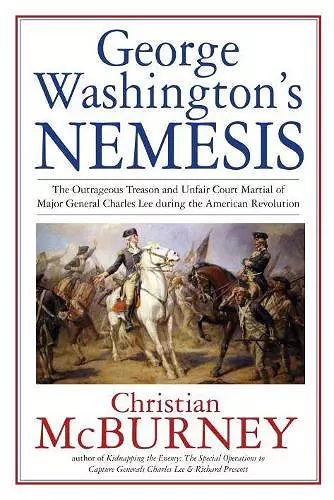George Washington’s Nemesis
The Outrageous Treason and Unfair Court-Martial of Major General Charles Lee During the American Revolution
Format:Hardback
Publisher:Savas Beatie
Published:31st May '20
Currently unavailable, and unfortunately no date known when it will be back

Revolutionary War historians and biographers of Charles Lee have treated him as either an inveterate enemy of George Washington or a great defender of American liberty. Neither approach is accurate argues author Christian McBurney, who stresses that in order to fully understand the war’s most complicated general, objectivity is required. His new book, George Washington’s Nemesis: The Outrageous Treason and Unfair Courtmartial of Major General Charles Lee during the American Revolution, relies on original documents (some newly discovered) to combine two dramatic stories involving the military law of treason and court-martials, creating a balanced view of the Revolution’s most fascinating personality. General Lee, second in command in the Continental Army led by George Washington, was captured by the British in December 1776. While a prisoner, he prepared and submitted to his captors a military plan on how to defeat Washington’s army as quickly as possible. This extraordinary act of treason, arguably on a par with Benedict Arnold’s heinous treachery, was not discovered during his lifetime. Many historians shrug off this ignoble act, but it should not be ignored. Less well known is that throughout his sixteen months of captivity and even after his release, Lee continued communicating with the enemy, offering to help negotiate an end to the rebellion. After Lee rejoined the Continental Army, he was given command of many of its best troops with orders from Washington to attack the rear of British General Henry Clinton’s column near Monmouth, New Jersey. Lee intended to attack on June 28, 1778, but retreated in the face of Clinton’s bold move to reverse his march. Two of Lee’s subordinate generals—without orders and without informing Lee—moved more than half of his command off the field. Faced with the possible destruction of the balance, Lee ordered a general retreat while conducting a skillful delaying action. Many historians have been quick to malign Lee’s performance at Monmouth, for which he was convicted by court-martial for not attacking and for retreating in the face of the enemy. This was a miscarriage of justice, stresses McBurney, for the evidence clearly shows that Lee was unfairly convicted and had, in fact, by retreating, performed an important service to the Patriot cause. The guilty verdict was more the result of Lee’s having insulted...
An interesting account of a fascinating character’s role in the American Revolution - one can always skip the legal discussion! * Miniature Wargames - Arthur Harman *
ISBN: 9781611214659
Dimensions: unknown
Weight: unknown
288 pages